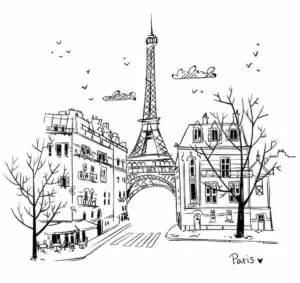French poets have been pivotal figures in literature, shaping the fabric of the French language and culture. Their poems, often associated with a deep sense of romanticism and symbolism, represent an intricate intertwining of language and emotion. This article delves into the history and the contributions of some of the most celebrated French poets, their famous works, and how they have influenced literature and art through the ages.

✅ AI Essay Writer ✅ AI Detector ✅ Plagchecker ✅ Paraphraser
✅ Summarizer ✅ Citation Generator
The Historical Context: French Poets in History
The French Revolution and Poetry
The French Revolution was a tumultuous period that significantly impacted literature. Many poets reflected the revolutionary ideals and societal changes in their poems. The political unrest during this era provided a rich backdrop for poetic expressions.
Art Critic Meets Poetry
As the art world evolved, French poets didn’t shy away from being art critics. They employed their knowledge of language to pen detailed art analyses and commentaries. Through poetic lenses, these poets and art critics painted a vivid picture of art pieces and exhibitions.
Romanticism in French Poetry
In the 19th century, the romantic movement bloomed, marked by a focus on emotion and individualism. French poets were central to this movement, weaving love-themed, sentimental, and emotional verses. Romantic French poets explored the depths of human feelings, nature, and imagination through their works.
Symbolism in French Poetry
Symbolism, a literary movement that rose in the late 19th century, was characterized by the use of symbolic representation and figurative language. French poets adeptly employed symbolism to evoke emotions and create layers of meanings in their poems. Through vivid imagery, they painted abstract concepts and mystical experiences.
3 Most Famous French Poets and Their Celebrated Works
Charles Baudelaire
- Famous Works: “Les Fleurs du mal” (The Flowers of Evil)
- Poetry Class: Symbolism, Romanticism
- Note: His poems are often dark and melancholic, with rich imagery.
Arthur Rimbaud
- Famous Works: “Une Saison en Enfer” (A Season in Hell)
- Poetry Class: Symbolism
- Note: Rimbaud’s poems are known for their visionary nature and rebellion against societal norms.
Paul Valéry
- Famous Works: “La Jeune Parque” (The Young Fate)
- Poetry Class: Symbolism
- Note: Valéry’s poetry is known for its philosophical themes and meticulous form.
French Language and Poetry Education
One cannot deny the allure of French poetry. A poetry class centered on the French language can be a deeply enriching experience. These classes often explore the various eras of French poetry, the famous works of poets, and the construction of poems in the French language. They also address how French poets employed literary devices to craft poems that transcended time.
The Enduring Influence of French Poets in Literature and Art
The influence of French poets on literature and art remains evident even today. Their timeless creations continue to resonate with readers around the world. The French language, through the words of these poets, embodies beauty, depth, and diversity.
Conclusion
French poets have woven an indelible mark on the tapestry of literature. Their contributions during historical periods like the French Revolution, their skill in embodying movements such as romanticism and symbolism, and their legendary poems continue to captivate the hearts and minds of many. French poetry remains a treasure trove that echoes through the ages, as each verse unfolds a realm of emotions, stories, and cultural heritage.
FAQ
What are some famous French poets?
Some renowned French poets include Charles Baudelaire, Arthur Rimbaud, Paul Valéry, Paul Verlaine, and Victor Hugo. Each of these poets has made significant contributions to French literature and poetry with their unique style and thematic focus.
How did French poets influence literature?
French poets have had a profound influence on literature through various literary movements such as Romanticism and Symbolism. They introduced innovative forms, themes, and linguistic styles. Their works often transcended borders and inspired literary changes globally, enriching world literature with new perspectives and expressions.
What are the major themes in French poetry?
French poetry covers a wide range of themes including love, nature, mortality, existentialism, societal changes, and political ideals. Different eras and literary movements have seen the dominance of various themes, such as Romanticism focusing on emotions and Symbolism employing abstract imagery.
Which French poets are known for their romantic works?
Victor Hugo, Alphonse de Lamartine, and Gérard de Nerval are some French poets renowned for their Romantic works. Their poetry is characterized by a deep emotional connection, fascination with nature, and exploration of individualistic themes.
How can I learn more about French poetry?
To learn more about French poetry, you can enroll in poetry classes or courses on French literature, read books and anthologies of French poetry, join literary clubs or forums, or engage with online resources such as blogs, podcasts, and webinars.
What are some essential French poetry collections to read?
Some essential collections to read include “Les Fleurs du mal” by Charles Baudelaire, “Alcools” by Guillaume Apollinaire, “Fêtes galantes” by Paul Verlaine, and “Odes et Ballades” by Victor Hugo. These collections encompass a rich variety of styles and themes central to French poetry.
Who is considered the father of French poetry?
François Villon is often considered the father of French poetry. He was one of the earliest poets to write in the French language during the 15th century. His works, including “Le Testament” (The Testament), are celebrated for their lyricism and for laying the groundwork for future French poetic expressions.
Follow us on Reddit for more insights and updates.





Comments (0)
Welcome to A*Help comments!
We’re all about debate and discussion at A*Help.
We value the diverse opinions of users, so you may find points of view that you don’t agree with. And that’s cool. However, there are certain things we’re not OK with: attempts to manipulate our data in any way, for example, or the posting of discriminative, offensive, hateful, or disparaging material.